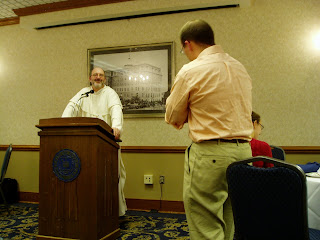
On March 14-16, 2008, the Notre Dame Center for Ethics and Culture, in conjunction with the Notre Dame Alumni Association, hosted the 23rd annual Notre Dame Medical Ethics Conference. The aim of the conference is to allow for discussion regarding some of the complex issues that plague the practice of medicine, in a setting not only where participants can come to a deeper understanding of Catholic teaching on these issues, but where diverse viewpoints can be shared, heard, and appreciated.
The conference opened on Friday afternoon with the annual Clarke Lecture. This year, we were pleased to welcome as our Clarke Lecturer Daniel P. Sulmasy, O.F.M., M.D., Ph.D., a Franciscan friar, the Sisters of Charity Chair in Ethics at St. Vincent’s Manhattan, and Professor of Medicine and Director at the Bioethics Institute of New York Medical College. Dr. Sulmasy delivered his lecture on the topic, “Is Health Care a Spiritual Discipline?” In the first session on Saturday morning, participants discussed a range of cases that involve the concept of futility. A number of participants from Texas have suggested for a number of years that we devote a session to a discussion of the Texas Futile Treatment Law, and we included information about that law in our readings. After the break, participants gathered for a discussion of some of the recent initiatives in reforming the health care system. The topic of health care reform is a hot-button issue in the current political campaign and we invited David Betson, a distinguished economist at Notre Dame, and an expert on proposals for health care reform, to give us a brief presentation on the options now on the table from an economist’s point of view.
After lunch, we returned to our discussion group format to examine a series of cases that raise difficult ethical questions about disease-labeling and possible inappropriate uses of drugs. Participants addressed the question of whether “disease-mongering” is a serious problem in contemporary medicine.
In the final session on Saturday, participants were given a choice among three concurrent break-out sessions. The first session considered ethical issues raised by the merger of a public hospital and a Catholic hospital. Many of our participants have worked in situations where similar mergers have occurred and a lively discussion ensued on this matter. The second break-out session examined Church teaching on the provision of artificial nutrition and hydration.
The third session explored the new medical powers of genetic technologies and the ethical issues raised by them. Saturday concluded with Mass celebrated in Alumni Hall Chapel with Father Bresnahan presiding and Father Young concelebrating. On Sunday morning, participants concluded the conference with our traditional wrap-up session. At this session we put all of our consultants at the front of the room and had an open-mike free-for-all. Last year, at this session, there was an energetic discussion initiated by some medical students in attendance about forming a new medical student association devoted to the integrity of the patient and to a broadly Catholic approach to the vocation of medicine, especially with regard to life issues. There was a general sense that we should take some steps toward forming such an association. To that end, this year, we invited two-dozen current medical students to attend this year’s conference to discuss the formation of such an association. They arrived on Thursday night, before the conference, meeting on Friday morning to explore ideas about the association and then attended the remainder of the conference.
In addition to our many fine resource participants, we were especially fortunate this year to have three distinguished international specialists in medical ethics visiting the university and able to join us. Father Vladimir Littva from the Catholic University in Ružomberok, Slovakia and Father Grzegorz Holub from the University of Kraków were both visitors at the Nanovic Institute for European Studies during the spring semester and joined us as consultants. An old friend of the Center, Prof. Ruiping Fan from the City University of Hong Kong who gave the Clarke Lecture only a few years ago was a visiting Fulbright Scholar in the Notre Dame Center for Ethics and Culture and also served as one of our consultants. Prof. Fan is one of the leading specialists in the world on Confucian approaches to medical ethics.
 Breaking Bread, our semi-annual dinner and evening of spiritual discussion for Notre Dame students and faculty, began only four years ago, but it has already secured a place in the hearts of undergraduates and professors alike. Students often share with us that it is rare to find a warm environment that fosters profound theological discussion with their professors. Especially in an age when many feel like the distance between the two groups is continually widening, Breaking Bread gives students the rare chance of talking with professors outside the classroom.
Breaking Bread, our semi-annual dinner and evening of spiritual discussion for Notre Dame students and faculty, began only four years ago, but it has already secured a place in the hearts of undergraduates and professors alike. Students often share with us that it is rare to find a warm environment that fosters profound theological discussion with their professors. Especially in an age when many feel like the distance between the two groups is continually widening, Breaking Bread gives students the rare chance of talking with professors outside the classroom.